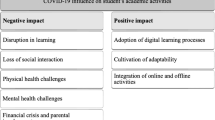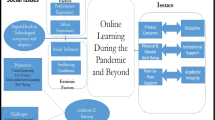Abstract
The consequences of the coronavirus pandemic present serious threats to the normal functioning of the global economy, societies worldwide and specific institutions, including educational services. Confronting challenges arising from the fact that the changes needed to be enacted quickly, educational providers have resorted to online learning solutions via various platforms to limit the ongoing spread of COVID-19. To deepen knowledge and understanding of the critical benefits and difficulties that online learning has created during the pandemic, the present study investigates student and lecturer perceptions regarding the use and execution of online learning in higher education institutions. The sample is comprised of students and lecturers based in Al-Baha University, Saudi Arabia. The study unearths the major difficulties encountered in using online learning methods and identifies the key factors which have enabled more effective use of these methods. The study will use interviews to collect qualitative data on Al-Baha University students and lecturers’ insights and use thematic analysis to analyse and interpret the ensuing data. The resultant data and analyses will be used to formulate practitioner recommendations as to how online learning systems can be more effectively deployed throughout the pandemic and in future scenarios in which online learning becomes essential to education.
Access this chapter
Tax calculation will be finalised at checkout
Purchases are for personal use only
Similar content being viewed by others
References
Lin, M.C., Chen, H.C., Chang, C.Y.: Implementation of E-learning in New Taipei City during COVID-19, EURASIA. J. Math. Sci. Technol. Educ. 18(4), em2092 (2022)
Alexa, L., Avasilcai, S., Pislaru, M., Bujor, A., Avram, E., Lucescu, L.: Exploring Romanian engineering students’ perceptions of Covid-19 emergency e-Learning situation. A mixed-method case study. Electron. J. e-Learning 20(1), 19–35 (2022)
Edem Adzovie, D., Jibril, A.B.: Assessment of the effects of Covid-19 pandemic on the prospects of e-learning in higher learning institutions: the mediating role of academic innovativeness and technological growth. Cogent Educ. 9(1), 2041222 (2022)
Kibuku, R.N.: An E-learning Theory for Interaction and Collaboration, University of Nairobi (2021)
Ghafur, H.: Analysis of ICT Development Supporting the E-Learning Implementation on Nadhatul Ulama Universities in Indonesia. J. Soc. Stud. Educ. Res. 12(4), 121–143 (2021)
Patra, S.K., Sundaray, B.K., Mahapatra, D.M.: Are university teachers ready to use and adopt e-learning system? An empirical substantiation during COVID-19 pandemic. Qual. Assur. Educ. 29(4), 509–522 (2021)
Lizcano, D., Lara, J.A., White, B., Aljawarneh, S.: Blockchain-based approach to create a model of trust in open and ubiquitous higher education. J. Comput. High. Educ. 32(1), 109–134 (2019). https://doi.org/10.1007/s12528-019-09209-y
Prasetyo, A.R., Nurtjahjanti, H., Ardhiani, L.N.: Impact of changes in teaching methods during the COVID-19 pandemic: the effect of integrative e-learning on readiness for change and interest in learning among Indonesian University students. Int. Rev. Res. Open Distrib. Learn. 22(2), 87–101 (2021)
Moustakas, L., Robrade, D.: The challenges and realities of E-Learning during COVID-19: the case of university sport and physical education. Challenges 13(1), 9 (2022)
Gaebel, M., Kupriyanova, V., Morais, R., Colucci, E.: E-Learning in European Higher Education Institutions: Results of a Map** Survey Conducted in October–December 2013. Eur. Univ. Assoc., p. 92 (2014). https://eua.eu/resources/publications/368:e-learning-in-european-higher-education-institutions.html. Accessed 20 Feb 2022
Ms, P., Toro, U.: A review of literature on knowledge management using ICT. High. Educ. 4(1), 62–67 (2013)
Gautam, P.: Advantages and disadvantages of online learning. E-Learning Ind. (2020)
Mukhtar, K., Javed, K., Arooj, M., Sethi, A.: Advantages, limitations and recommendations for online learning during COVID-19 pandemic era. Pak. J. Med. Sci. 36, OVID19-S4, p. S27 (2020)
Yengin, I., Karahoca, A., Karahoca, D.: E-learning success model for instructors’ satisfactions in perspective of interaction and usability outcomes. Procedia Comput. Sci. 3, 1396–1403 (2011)
Somayeh, M., Dehghani, M., Mozaffari, F., Ghasemnegad, S.M., Hakimi, H., Samaneh, B.: The effectiveness of E-learning in learning: a review of the literature. Int. J. Med. Res. Heal. Sci. 5(2), 86–91 (2016)
Umar, M., Ko, I.: E-Learning: direct effect of student learning effectiveness and engagement through project-based learning, team cohesion, and flipped learning during the COVID-19 pandemic. Sustainability 14(3), 1724 (2022)
Schnieders, E., et al.: Real-life evaluation of an interactive versus noninteractive e-Learning module on chronic obstructive pulmonary disease for medical licentiate students in Zambia: web-based, mixed methods randomized controlled trial. JMIR Med. Educ. 8(1), e34751 (2022)
Aboagye, E., Yawson, J.A., Appiah, K.N.: COVID-19 and E-learning: the challenges of students in tertiary institutions. Soc. Educ. Res. 2, 1–8 (2021)
Radha, R., Mahalakshmi, K., Kumar, V.S., Saravanakumar, A.R.: E-Learning during lockdown of Covid-19 pandemic: a global perspective. Int. J. Control Autom. 13(4), 1088–1099 (2020)
Ali, M., Hossain, S.M.K., Ahmed, T.: Effectiveness of E-learning for university students: evidence from Bangladesh. Asian J. Empir. Res. 8(10), 352–360 (2018)
El-Seoud, S.A., Taj-Eddin, I., Seddiek, N., El-Khouly, M.M., Nosseir, A.: E-learning and students motivation: a research study on the effect of e-learning on higher education. Int. J. Emerg. Technol. Learn 9(4), 20–26 (2014)
Harandi, S.R.: Effects of e-learning on students’ motivation. Procedia-Social Behav. Sci. 181, 423–430 (2015)
Jethro, O.O., Grace, A.M., Thomas, A.K.: E-learning and its effects on teaching and learning in a global age. Indian J. Educ. Inf. Manag. 1(2), 73–78 (2012)
Selim, H.M.: E-learning critical success factors: an exploratory investigation of student perceptions. Int. J. Technol. Mark. 2(2), 157–182 (2007)
Goyal, S.: E-Learning: future of education. J. Educ. Learn. 6(2), 239–242 (2012)
Arkorful, V., Abaidoo, N.: The role of e-learning, advantages and disadvantages of its adoption in higher education. Int. J. Instr. Technol. Distance Learn. 12(1), 29–42 (2015)
Myers, M.D., Avison, D.: Qualitative Research in Information Systems: A Reader. SAGE Publishing, California (2002)
Creswell, J.W.: A Concise Introduction to Mixed Methods Research. SAGE Publishing, California (2021)
Denscombe, M.: The good research guide: For small-scale social research projects (Open UP Study Skills). McGraw-Hill (2010)
Braun, V., Clarke, V.: Using thematic analysis in psychology. Qual. Res. Psychol. 3(2), 77–101 (2006)
Patton, M.Q.: Qualitative Research & Evaluation Methods: Integrating Theory and Practice. SAGE Publishing, California (2014)
Quick, J., Hall, S.: Part two: qualitative research. J. Perioper. Pract. 25(7–8), 129–133 (2015)
Strauss. A., Corbin, J.: Basics of Qualitative Research. SAGE Publishing, California (1990)
Howell, D.C.: Encyclopedia of statistics in behavioral science. 3, 1570–1579 (2003)
Acknowledgment
This research was funded by the deanship of Scientific Research, Al-Baha University, KSA (Grant No: 1440/19). Also, this research study is a part of a funded project entitled” The Effectiveness of Using Social Networks Applications in University Education: An Applied Study on Al-Baha University”. Thus, the support and assistance of the university is very much valued.
Author information
Authors and Affiliations
Corresponding author
Editor information
Editors and Affiliations
Rights and permissions
Copyright information
© 2023 The Author(s), under exclusive license to Springer Nature Switzerland AG
About this paper
Cite this paper
Alghamdi, M.Y. (2023). An Exploration of Students and Lecturers’ Insights of Online University Learning Implemented During the COVID‐19 Contagion. In: Arai, K. (eds) Intelligent Systems and Applications. IntelliSys 2022. Lecture Notes in Networks and Systems, vol 542. Springer, Cham. https://doi.org/10.1007/978-3-031-16072-1_31
Download citation
DOI: https://doi.org/10.1007/978-3-031-16072-1_31
Published:
Publisher Name: Springer, Cham
Print ISBN: 978-3-031-16071-4
Online ISBN: 978-3-031-16072-1
eBook Packages: Intelligent Technologies and RoboticsIntelligent Technologies and Robotics (R0)




